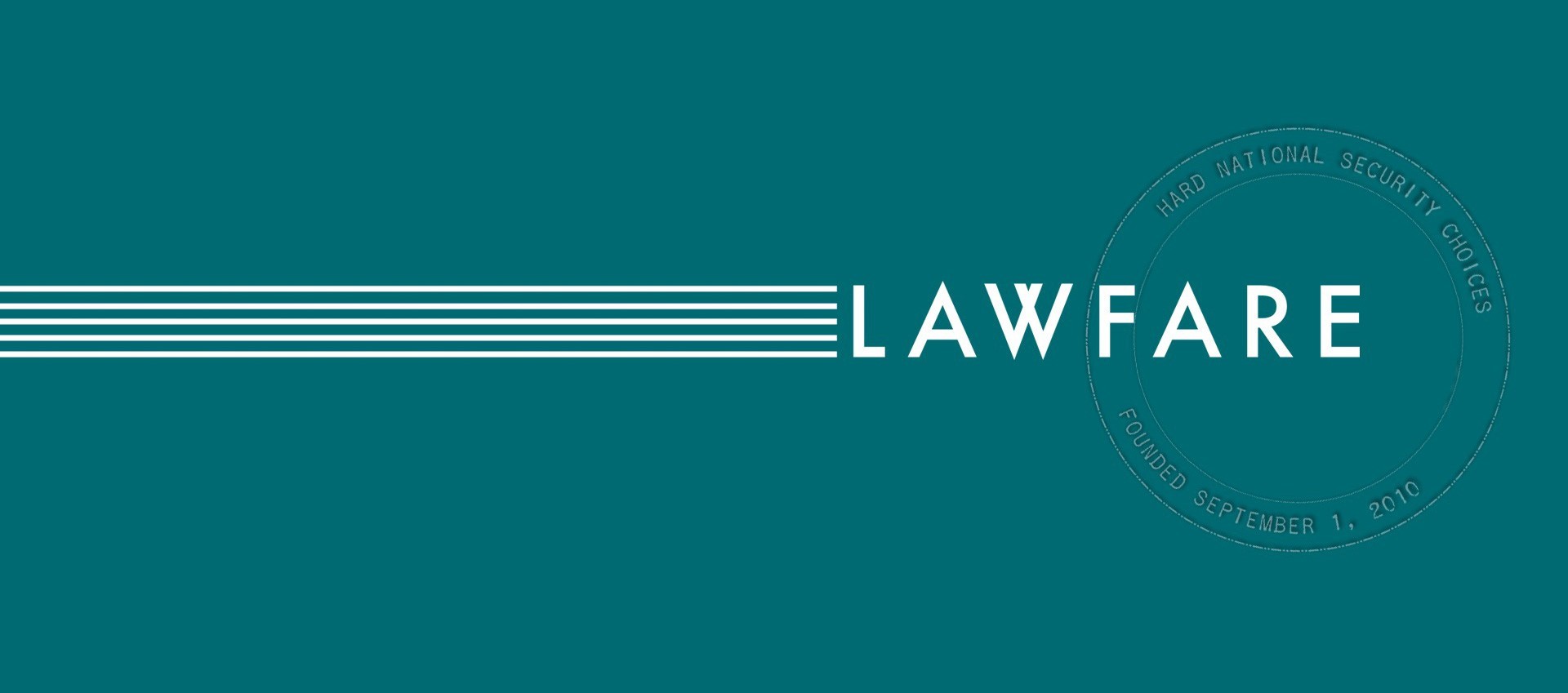The Week That Was: All of Lawfare in One Post

Published by The Lawfare Institute
in Cooperation With

The Lawfare team provided an overview of the four-count indictment of former President Donald Trump by a D.C. grand jury for crimes related to his alleged interference in the 2020 election and role in the Jan. 6 Capitol attack.
The Lawfare team also analyzed the four statutes invoked against Trump in his indictment for alleged 2020 election- and Jan. 6-related crimes: 18 U.S.C. § 371 (conspiracy to defraud the United States), 18 U.S.C. § 1512(k) (conspiracy to obstruct an official proceeding), 18 U.S.C. §§ 1512(c)(2) (obstruction of and attempt to obstruct an official proceeding), and 18 U.S.C. § 241 (conspiracy against rights).
The Lawfare team also discussed the evidence presented in the D.C. grand jury’s indictment of Trump. They covered the possible identities of the six co-conspirators mentioned in the indictment, the story told by the special counsel’s evidence, and more.
Katherine Pompilio shared an indictment against Trump charging him with four felonies related to his alleged attempt to overturn the 2020 election and the resulting Jan. 6 Capitol attack.
Pompilio also shared a new page, “Docket Watch: Trump Prosecuted in DC.” The page tracks primary source documents or other materials related to the indictment of former President Donald Trump for his alleged effort to overturn the results of the 2020 presidential election.
On Aug. 1 at 7 p.m. ET, Benjamin Wittes, Quinta Jurecic, Scott R. Anderson, and Natalie Orpett sat down with Roger Parloff and Anna Bower to unpack the recent indictment of Trump by a D.C. grand jury.
Bower reported on former President Donald Trump’s arraignment in Washington, D.C. for alleged crimes related to attempts to overturn the results of the 2020 presidential election.
On Aug. 3 at 5:30 p.m., Wittes and Jurecic sat down with Bower to discuss Trump’s arraignment in D.C. and what happened in the courtroom.
On Rational Security, Anderson, Jurecic, and Alan Rozenhtein sat down with Wittes to discuss the week’s big national security news stories, including Trump’s indictment for trying to overthrow the results of the 2020 election, the odds of Congress renewing Section 702, the legitimacy of stories concerning Hunter Biden’s alleged criminal activity, and more:
Gia Kokotakis shared the government’s motion in the Mar-a-Lago classified documents case requesting a hearing to investigate potential conflicts of interest on Waltine Nauta’s defense team.
Kokotakis also shared an order from a Fulton County judge rejecting Trump’s motion to preclude further prosecution, quash the special purpose grand jury’s final report, and disqualify District Attorney Fani Willis in the investigation into his alleged criminal interference in Georgia’s 2020 general election.
Pompilio shared a notice filed by Justice Department lawyers alerting the U.S. District Court for the District of Columbia of “apparent threats” against Justice Department personnel in Tweets written by the defense counsel for three Jan. 6 defendants.
Kokotakis shared a petition to the Supreme Court by lawyers representing Garret Miller, a Capitol rioter arrested for Jan. 6-related crimes, challenging the Justice Department’s application of § 1512(c) obstruction of justice offenses to Miller’s and other Jan. 6 defendants’ cases.
Mykhailo Soldatenko analyzed a recent joint declaration by the leaders of G-7 countries to strengthen Ukrainian self-defense capabilities by establishing a framework for negotiating bilateral security commitments with Ukraine. He discussed how the joint declaration resolves issues arising from the ambiguity of the Budapest Memorandum while increasing partners’ credibility by facilitating long-term formal agreements with Ukraine.
On the Lawfare Podcast, Anderson sat down with Shashank Joshi to discuss military lessons Western leaders learned from the Ukraine conflict and what the Russian invasion might mean for the future of war:
Heather J. Williams and Caitlin McCulloch discussed “Truth Decay,”—the diminishing role of facts and analysis in American public life—and how it impedes effective intelligence collection and analysis, damages the relationship between intelligence agencies and the public sphere, and diminishes U.S. credibility with allies. They recommended a more robust cross-sector effort to understand and mitigate the negative effects of Truth Decay.
Anna Hickey shared a new report from the President’s Intelligence Advisory Board advocating for the reauthorization of FISA Section 702 along with 13 recommendations for how the FBI should use Section 702.
Tyler McBrien shared the unsealed indictments of two U.S. Navy sailors who allegedly accepted payment from Chinese intelligence officers in exchange for sensitive military information, including photographs, videos, and information on the locations of Navy ships.
On Chatter, Shane Harris sat down with Tina Satter to discuss her new film, “Reality.” The film tells the story of the FBI’s questioning of Reality Winner over an unauthorized leak of classified information concerning Russian interference in U.S. elections:
Caroline D. Krass discussed a recent Department of Defense update to its Law of War Manual that expands discussion of the legal requirements in determining and verifying whether a person or object is a lawful military target.
On the Lawfare Podcast, McBrien sat down with Brad Samuels to discuss why forensic reconstructions and other visual investigations are so useful in the pursuit of justice for war crimes and other abuses, how Samuels and his colleagues build them, and the potential dangers of victim retraumatization that accompany these technologies:
In this week’s edition of Lawfare’s Foreign Policy Essay series, Romain Malejacq and Niels Terpstra analyzed why international efforts to use sanctions and foreign aid as leverage against the Taliban have failed. They suggested turning toward a strategy of pressure for accountability from within Afghan society and behind-the-scenes diplomatic engagement.
David Mansfield discussed corrupt cross-border trading in Afghanistan, arguing that more robust methods of data collection taking into account these unreported imports and exports are needed in order to accurately assess the Afghan economy under the Taliban.
Pablo Chavez discussed international AI competition. He argued that the current dynamic global AI ecosystem presents the United States with the opportunity to lead a coordinated governance and economic development approach with the goal of reaching digital solidarity.
Eugenia Lostri shared the National Cyber Workforce and Education Strategy, an element of the Biden administration’s national cybersecurity strategy that concerns the development of a workforce to handle the demands of evolving technologies and to provide U.S. citizens with improved digital skills.
On the Lawfare Podcast, McBrien sat down with Christy Lopez to discuss the history of police conduct pattern or practice investigations, including common trends of police abuse these investigations uncover and if we have entered a broader societal reckoning with the ideas of policing and public safety:
And also on the Lawfare Podcast, Anderson sat down with Harris to discuss recent Congressional testimony on Unidentified Aerial Phenomena, or UAPs. They covered how the witnesses’ testimony fits into the broader universe of reports relating to UAPs, which parts reflect serious policy issues, and how to separate the wheat from the chaff in the broader UAP debate:
And that was the week that was.




